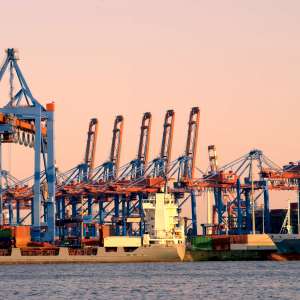Comprehensive Guide to Shipping from Montreal to Hong Kong
Latest update on 13 Nov, 2024 by Caspian Ng– Marketing Analyst at FreightAmigo
Navigating the complexities of international shipping, particularly from Vancouver to Hong Kong , requires a thorough understanding of logistics, including options for cargo transportation, customs regulations, and optimizing transit times. The significance of this trade route cannot be overstated, as it connects one of North America’s busiest seaports with one of Asia’s key financial and shipping hubs. Whether it’s for businesses moving freight or individuals sending personal items, mastering the details of shipping services, including sea freight, air freight, and even road connections, is essential for efficiency, cost-effectiveness, and environmental consideration.
This article offers a deep dive into the logistics of shipping from Montreal to Hong Kong, focusing on the available carriers, the pros and cons of shipping container options, and the impact of customs clearance processes. It meticulously compares the costs associated with air freight versus sea freight, considering the balance between shipping rates and transit times. Furthermore, it highlights the environmental footprint of different shipping methods and outlines key considerations such as choosing the right shipping services, understanding the capacity and limitations of cargo transportation, and navigating seaports and carriers infrastructure. With this comprehensive guide, readers will gain insights into making informed decisions for their international shipping needs, ensuring their cargo arrives safely, promptly, and within budget.
Want To Compare The Best Express, Air Freight, Sea Freight, Rail Freight & Trucking Rates So As To Have Better Control On Cost?
Understanding the Shipping Options
When shipping from Montreal to Hong Kong, individuals and businesses have several options, each with distinct advantages depending on the specific needs such as budget, speed, and environmental impact. This section explores the primary methods of transportation: air freight, sea freight, and road freight.
Air Freight
Air freight offers the fastest transit times for shipping goods between Montreal and Hong Kong. With services like KLM operating regular flights, goods can be transported in approximately 25 hours, making it an ideal choice for time-sensitive shipments. Air freight is particularly suitable for high-value, lightweight, or perishable items that require quick delivery. Despite its higher cost compared to other shipping methods, the speed and reliability of air freight provide significant value, especially for businesses dealing in sectors like pharmaceuticals or technology where timing is crucial. Additionally, air freight services often include comprehensive tracking and handling, ensuring goods are not only quickly delivered but also carefully monitored throughout their journey.
Sea Freight
Sea freight is the most cost-effective method of transporting goods internationally and is particularly viable for large or heavy shipments that do not require fast delivery. The journey by sea from Montreal to Hong Kong typically takes about 39 days, with carriers like China United offering departures every 1-2 weeks. This method is not only economical but also less carbon-intensive compared to air freight, making it a preferred choice for environmentally conscious shippers. Moreover, sea freight allows for the transportation of larger volumes in containers, which can be either Full Container Load (FCL) or Less Than Container Load (LCL), providing flexibility according to the shipment size.
Road Freight
While not the primary mode for international transit between Montreal and Hong Kong, road freight plays a crucial role in the initial and final stages of the shipping process. It is essential for transporting goods to and from airports and seaports. Road freight provides flexibility and accessibility, allowing for door-to-door delivery services that are crucial for the efficient handling of cargo. This mode is integral to the logistics chain, ensuring that goods transported by air or sea are efficiently moved to their final destination without delays.
Each shipping method offers unique benefits and can be selected based on the specific requirements of the shipment, including cost considerations, delivery speed, and environmental impact. By understanding the options available, shippers can make informed decisions that best suit their logistics needs.
Cost Comparison
Air Freight Costs
Air freight, while offering the quickest transit times, is generally the most expensive mode of shipping from Montreal to Hong Kong. The typical journey by air can take approximately 25 hours, with carriers like KLM providing regular services. The cost associated with air freight is significantly higher due to the speed and the logistical requirements of handling sensitive or perishable goods. Additionally, the environmental cost is notable, with estimated emissions of 547 kg CO₂ per 100kg of cargo. This mode is particularly suitable for urgent shipments or goods that require careful handling.
Sea Freight Costs
Sea freight presents a more economical alternative, especially for larger or heavier shipments that do not require fast delivery. The journey spans approximately 39 days from Montreal to Hong Kong, with vessels departing every 1-2 weeks. The cost-effectiveness of sea freight is complemented by its lower carbon footprint, emitting about 594kg CO₂ per TEU (Twenty-foot Equivalent Unit). This mode is ideal for bulk goods and is significantly more sustainable in terms of environmental impact compared to air freight.
Road Freight Costs
Road freight is essential for the initial and final legs of the shipping process, particularly in transporting goods to and from ports or airports. While not used for the main transit between Montreal and Hong Kong, its costs are primarily considered in the context of local transportation. Road freight provides flexibility and is crucial for door-to-door delivery services, ensuring that shipments reach their final destination efficiently. This mode is integral to the overall logistics chain, acting as a connector between sea or air freight and the final delivery points.
Environmental Impact
Emissions from Air Freight
Air freight significantly impacts the environment due to its substantial greenhouse gas emissions. Aircraft powered by fossil fuels release large amounts of carbon dioxide (CO2) and other greenhouse gases into the atmosphere, contributing to climate change. For instance, transporting cargo by air from Montreal to Hong Kong generates approximately 547kg of CO2 per 100kg of cargo. This high level of emissions is a consequence of the total fuel burn of aircraft on this route, divided by their cargo capacity. While air freight offers efficiency and speed, the environmental costs are considerable, highlighting a crucial trade-off in sustainable logistics practices.
Emissions from Sea Freight
Sea freight, while slower, presents a lower carbon footprint compared to air freight. The emissions involved in transporting a standard shipping container (TEU) from Vancouver to Hong Kong by sea are estimated at 594kg CO2 per TEU. This calculation is based on the average emissions from container ships on this trade route, taking into account the ship’s total capacity. Despite its slower speed, sea freight’s lower emissions make it a more environmentally friendly option. Additionally, ocean freight contributes to ocean acidification, a less visible but equally concerning environmental issue. The absorption of CO2 by oceans disrupts marine ecosystems and raises questions about the sustainability of current shipping practices.
Emissions from Road Freight
Road freight plays a crucial role in the shipping process, especially in the initial and final stages of cargo transportation. It is essential for moving goods to and from ports and airports. Although not the primary mode for long-distance international shipping, road freight’s environmental impact cannot be overlooked. Local transportation of goods involves emissions that, while lower per kilometer compared to air freight, still contribute to air pollution and greenhouse gas emissions. Road freight’s flexibility and necessity in the logistics chain make it an integral part of environmental considerations in shipping strategies.
Key Considerations When Shipping
When shipping from Montreal to Hong Kong, several key considerations must be addressed to ensure a seamless and efficient process. These include understanding customs and regulations, considering the nature of the goods being shipped, and ensuring appropriate insurance coverage.
Customs and Regulations
Navigating customs and regulations is a critical aspect of international shipping. Shippers must be well-versed in the specific requirements and legal stipulations that govern both Canadian and Hong Kong customs processes. This includes preparing accurate documentation such as bills of lading, commercial invoices, and packing lists. Additionally, understanding tariff classifications, import duties, and potential inspection requirements is essential to avoid delays and additional costs. Compliance with these regulations not only ensures that the goods are cleared quickly but also helps in maintaining a good standing with customs authorities, facilitating smoother transactions in future shipments.
Nature of Goods
The nature of the goods being shipped plays a pivotal role in determining the appropriate shipping method and handling procedures. Perishable items, hazardous materials, and high-value goods each require specific considerations. For instance, perishable goods may need refrigerated containers and faster transit times, while hazardous materials must comply with international safety standards and require special handling and documentation. Understanding the specific needs of the cargo can help in choosing the right carrier and shipping method, thereby minimizing the risk of damage or loss during transit.
Insurance
Securing comprehensive insurance coverage is crucial when shipping internationally. Insurance protects against potential losses due to damage, theft, or loss of goods during transit. It is important to choose a policy that adequately covers the value of the cargo and addresses specific risks associated with the chosen transit mode. For example, sea freight might require coverage for water damage, whereas air freight might focus more on handling damages. Consulting with an insurance expert to tailor a policy that fits the specific needs of the shipment can provide peace of mind and financial protection for shippers.
By carefully considering these aspects—customs and regulations, the nature of the goods, and insurance—shippers can enhance the efficiency and security of their shipping operations from Montreal to Hong Kong.
Conclusion
Through the exploration of various shipping methods from Montreal to Hong Kong, this article has provided a comprehensive understanding of the considerations necessary for an efficient, cost-effective, and environmentally conscious shipping process. From the swift yet costly air freight options to the more economically and environmentally viable sea transport, along with the indispensable role of road freight in connecting the dots, businesses and individuals are equipped with the knowledge to make informed decisions. Moreover, the discussion on the critical aspects of customs and regulations, the specific needs based on the nature of goods, and the importance of securing appropriate insurance emphasizes the multi-faceted approach required for successful international shipping.
As the global landscape of trade and transportation continues to evolve, staying informed and prepared for the challenges and opportunities of shipping routes like Montreal to Hong Kong becomes increasingly important. Whether it’s for personal or business purposes, ensuring your goods arrive safely, on time, and within budget requires a deep understanding of the logistics involved. For those ready to navigate these waters, seeking expert assistance can make all the difference. If you are planning to ship from Montreal to Hong Kong, please go to the FreightAmigo page for inquiries, where you can find tailored solutions that meet your shipping needs. By choosing the right partners and strategies, shippers can not only optimize their operations but also contribute to more sustainable and efficient global trade practices.
If You Are Planning To Ship From Vancouver To Hong Kong, Please Go To The FreightAmigo Page For Inquiries.
Read more:
Efficient Shipping from Ningbo to Vietnam: The Ultimate Guide
Shipping to Hong Kong from US
Shipping from Hong Kong to Vancouver, BC (CAVAN): A Comprehensive Guide
If you have any inquiries on logistics / supply chain, feel free to contact FreightAmigo now:
Chat with us online | Hotline: +852 28121686 | WhatsApp: +852 27467829









































